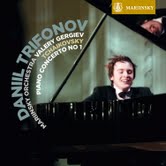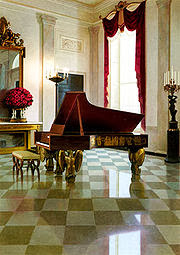In review--Russian masterful
Tchaikovsky Piano Concerto No. 1
Mariinsky label
Distributor--Harmonia Mundi
As a listener, I felt exasperated several times while trying
to keep up with all the changes of pace, of intensity, and dare I say, style in
the first movement of Tchaikovsky’s first piano concerto. Most famous is the opening with its sweeping
romantic mood, but this theme is never repeated, despite its endearing
qualities. Similar to Indian ragas (but
not in sound or style or genre), Tchaikovsky explored his musical terrain while
painting moods with his orchestration and never easing up on the pianist who
requires physical endurance to make it to the end of this movement. It’s not quite the athletic event as playing
Rachmaninoff or Prokofiev’s piano concertos, but it still must feel like
running a marathon with fingers.
Alternating between fiery romantic and dreamy light, this movement runs
20 minutes and then it ends on timpani rolls, and horns playing elongated
notes.
The second and third movements are not as memorable, but at
least give the musicians some respite, especially the lyrical folksy second
movement. If I had to choose two more
musical pieces on the recording as favorites, I would choose, Chopin’s Barcarolle which feels relaxing even
with its intensity increasing in volume and passion. And I would choose the
Schubert song Auf Dem Wasser Zu Singen
(don’t ask me to interpret the title), a calm nocturnal piece that recalls
Beethoven’s Moonlight Sonata. All and all, Daniil Trifonov and the
Mariinsky Orchestra deliver solid work that’s bursting to the brim with Russian
passion.
Distributed by http://www.harmoniamundi.com




Comments
Post a Comment